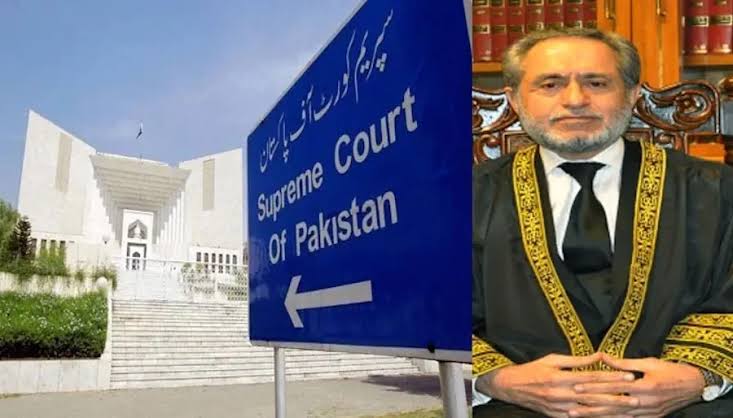Where would the trial take place if a military or warplane is hijacked? Justice Musarrat Hilali
In a field marshal court, there is a defense lawyer, but no judge: Justice Hassan Azhar Rizvi
Those violating the Official Secrets Act are tried under the Army Act: Lawyer
Only 3 cases were presented to the court; in total, there are 35 FIRs from May 9 and 5,000 accused. Military courts will try only 105 individuals: Additional Attorney General
The court adjourned the hearing until Monday.
Islamabad (Web News)
Justice Jamal Mandokhel remarked that the Army Act applies only to the military in the Supreme Court case related to civilian trials in military courts. A seven-member constitutional bench, led by Justice Aminuddin Khan, heard the case. The constitutional bench of the Supreme Court adjourned the hearing of the case related to civilian trials in military courts until Monday. Khawaja Haris, the lawyer for the Ministry of Defense, presented arguments. Justice Jamal Mandokhel raised the question of satisfying the court regarding the trial procedures in military courts. Justice Musarrat Hilali clarified that the officer conducting the trial does not deliver the judgment himself; the case is sent to a higher officer for a decision. She further explained that how can an officer who has not heard the trial give a judgment? Justice Jamal Mandokhel commented that he has been in this field for 34 years but still does not consider himself fully knowledgeable. Does the officer have enough experience and expertise to pass a death sentence? The lawyer responded that the procedure for military trials would be explained in the second part of the argument.
Justice Naeem Akhtar Afghan, speaking to the lawyer, asked about Article 10-A, which pertains to a fair trial, and inquired about the basic human rights involved in military court trials. He also asked about the stages and procedures of military court trials. Everyone understands that military court trials are not the same as civilian court trials; can an example of military court trials be provided? Justice Naeem Akhtar Afghan mentioned that he had conducted many court martials in Balochistan.
Justice Jamal Mandokhel remarked that there is a difference between the Army Act and other laws. The constitution provides protection for fundamental rights, and the law includes clear explanations. Justice Muhammad Ali Mazhar commented that the procedure for court martials is prescribed. Justice Hassan Azhar Rizvi remarked that in a field marshal court, there is a defense lawyer, but no judge. Justice Jamal Mandokhel added that the Army Act applies only to the military. We will consider whether military officers are entitled to fundamental rights or not. Justice Jamal Mandokhel also stated that an appeal against military court decisions can only be heard to a certain extent, and appeals against military court decisions can only address malice or jurisdiction; the merits of the case cannot be debated.
Khawaja Haris, the lawyer, responded that military court decisions cannot be challenged on the grounds of basic rights. The court remarked that, in that case, the Army Act should be restricted rather than expanded. Justice Jamal Mandokhel added that the question concerns the rights of these 7 or 8 lakh military personnel. Justice Jamal Mandokhel further stated that the court is here to deliver justice to both civilians and military personnel. Even military personnel should have the right to appeal in other courts. If someone receives an unjust death sentence, why can no one review it? The unjust killing of one person is the killing of humanity.
Justice Musarrat Hilali asked if the Supreme Court could reverse a decision. She also inquired if, in other countries, military court judges were military personnel. Khawaja Haris, the lawyer, replied that different cases have different procedures. The court stated that if someone is caught alive attacking the military, they are taken to a military court. Justice Musarrat Hilali remarked that even after martial law, the trial did not take place in a military court, and the hijacking of a plane was tried in an Anti-Terrorism Court (ATC). Khawaja Haris, the lawyer, responded that plane hijacking is not a crime under the Army Act, which led Justice Aminuddin to remark that the distinction on this point had now become clear.
Justice Musarrat Hilali then asked if a military or warplane is hijacked, where would the trial take place? If the hijacking of a plane is under the jurisdiction of an ATC, then so should an attack on a government building, she said. The lawyer responded that violations of the Official Secrets Act are tried under the Army Act, but the Army Act does not apply to all terrorists. The court asked if military courts had conducted trials only for the cases registered under the charges mentioned. The cases presented in the three FIRs do not contain provisions of the Official Secrets Act. The Ministry of Defense’s lawyer replied that additional provisions could be added after investigation. Justice Muhammad Ali Mazhar remarked that there is a separate procedure for adding additional provisions and inquired whether the police had relied solely on the investigation.
Khawaja Haris, the lawyer, explained that when a suspect is in military custody, there is a separate investigative system in place. Additional Attorney General Amir Rehman informed the court that only three cases had been presented to the court. There are 35 FIRs from May 9 with 5,000 accused, but only 105 individuals, whose presence was confirmed, were tried in military courts. The court then adjourned the hearing until Monday.

